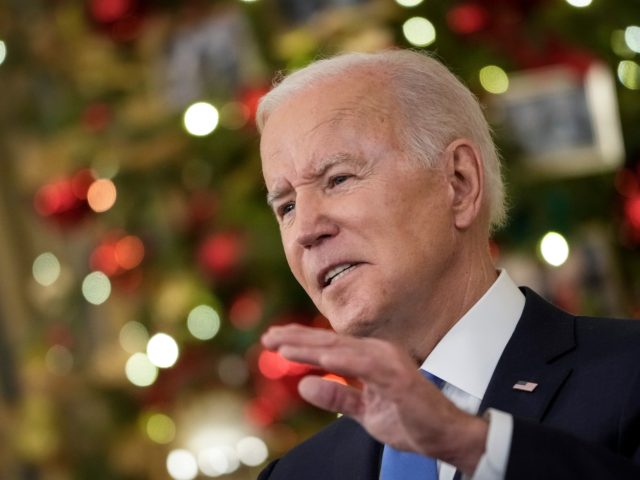President Joe Biden sounded the alarm about the rise in coronavirus cases on Tuesday, but made no mention of existing or future treatments for the virus.
“The answer is straightforward: If you are not fully vaccinated, you have good reason to be concerned,” Biden said, citing fears of the omicron variant spreading quickly through the United States.
The president repeatedly urged Americans to get vaccinated and a third booster shot to protect them from severe illness and death.
“Let me say again and again and again and again: Please get vaccinated. It’s the only responsible thing to do. And those who are not vaccinated are causing hospitals to overrun — become overrun again,” he pleaded.
But Biden did not mention other therapies for the virus, including monoclonal antibodies or new antiviral pills the federal government has already purchased and are awaiting authorization by the Food and Drug Administration.
.@JoeBiden: "I know vaccination requirements are unpopular———for many. They're not even popular for those who—are anxious to get them. My administration has put them in place not to control your life, but to save your life——and the lives of others." pic.twitter.com/qtIgXg1B6z
— Breitbart News (@BreitbartNews) December 21, 2021
The Biden administration is expected to take 4 million treatments for coronavirus at the end of January, according to Bloomberg News.
Approval for some of antiviral pills from Pfizer and Merck could come as soon as this week, the report noted, signaling hope for reducing coronavirus deaths in the new year, even among the unvaccinated.
It’s unclear why Biden made no mention of the alternative treatments for coronavirus, instead focusing only on the vaccines.
The president has previously touted the treatments as positive news.
Biden’s approval rating on the Chinese coronavirus has sunk underwater after he placed vaccine mandates on mid-sized to large businesses and federal employees and contractors, according to Tuesday’s Quinnipiac University poll. https://t.co/ZPWwnMkjma
— Breitbart News (@BreitbartNews) September 15, 2021
On December 2, he said in a speech the antiviral pills were “on the horizon that could help prevent hospitalizations and death.”
“We’ve secured enough supply of these pills already. And early indications are that these treatments will remain effective in the face of Omicron,” he said.
During the same speech, Biden also promoted the existence of monoclonal antibody treatments, noting they reduced the risk of hospitalization by 70 percent.

COMMENTS
Please let us know if you're having issues with commenting.